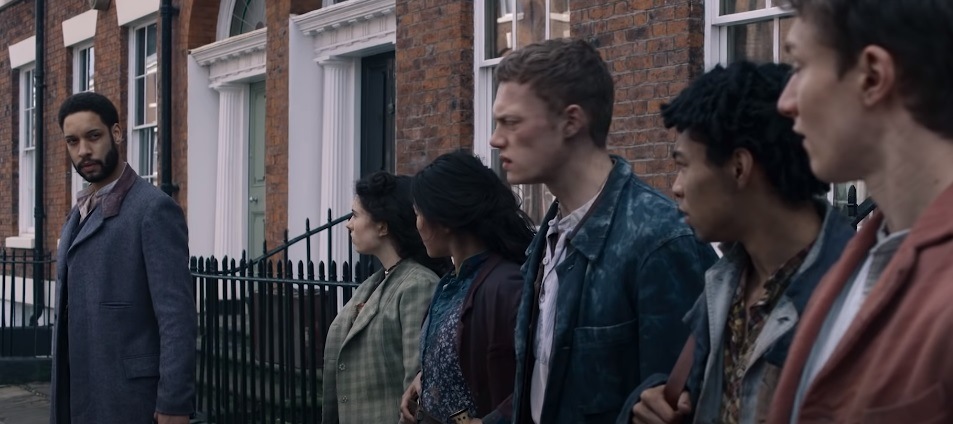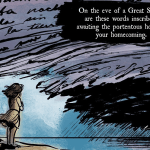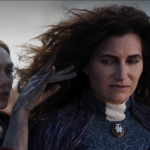“The Irregulars” Season 1 Offers More Sad Queer Storytelling & Boring Tropes

I think we all know that when it comes to Netflix, shows with interesting premises being bogged down by tropey writing isn’t anything new. And unfortunatley, The Irregulars also falls under the same category, complete with sad queer storytelling in the year 2021.
This review of The Irregulars includes major spoilers. You have been warned.
I was looking forward to watching The Irregulars. When you think of the popular Sherlock Holmes franchise, you don’t instantly think about the paranormal and the occult. Sherlock’s more into the science and logic of things. That’s why seeing him and John Watson use a group of street kids to offer a different perspective when handling strange events could have worked quite well. However, while the concept worked on paper and the cast is more than capable to deliver what’s required, the creatives behind The Irregulars couldn’t properly execute everything on the screen. This show is unable to swim away from the tropey writing constantly dragging it down.
The Irregulars takes place in Victorian London. Our main group of street urchins includes sisters Bea (Thaddea Graham) and Jessie (Darci Shaw) along with their friends Billy (Jojo Macari) and Spike (McKell David). All four of them are homeless and doing everything possible to survive in a harsh world. Bea, Billy, and Spike are also worried about Jessie who continues to experience horrible nightmares and can strange sense things others can’t. Due to Bea and Jessie’s mother (named Alice) taking her own life and not being mentally well, the teens are afraid Jessie might be going down the same route. They require funds to give Jessie the treatment she requires.
Bea’s need for money is what leads her to accept John Watson’s (Royce Pierreson) deal to help him gain information about a handful of kidnapped babies. And thus begins our main cast’s first foray into uncovering the paranormal entities taking over London. Over the course of the 8-episode first season, we find out that a rift between the supernatural and the normal world is expanding. A similar event occurred 15 years ago and it’s connected to what happened to Alice. The teens have to figure out a way to close the rift and save their world. Their adventure also offers answers to Bea and Jessie’s lineage.
The sisters are the main characters in the narrative. And while the writers did try to flesh out the likable Billy and Spike in the ensemble, it’s clear the two are supporting characters. Another boy named Leopold (Harrison Osterfield) joins the group in the first episode, and frankly, the show didn’t need him.
Seeing Prince Leopold running away from the palace to spend time with street urchins (the group being oblivious to his true identity) and pretend to be poor was quite grating. I have no idea why he wasn’t dragged back to the palace.
Also, seeing incredibly privileged people pretend to be poor to experience something different is a narrative choice I’m not a fan of, no matter how boring the rich person’s life is, they still have a comfortable home to go back to. It’s not like Leopold’s being abused or poisoned. Not only that, Leopold continued to grow romantically close to Bea and the two even slept together while Leopold hid his true identity from her. I’m not sure where such a choice from Leopold stands when talking about how consent is depicted in media.
With Bea already dealing with the loss of her mother at a very young age and not knowing where she belongs, having her be romantically entangled with Leopold felt unnecessary. And even more relationship drama was added through Billy’s crush on Bea.
I don’t understand writers making characters be involved in messy relationship drama and said drama taking away time that could be better used to offer effective character-centric moments. It’s as if Leopold existed just to make Bea’s life harder. And as the series progressed, it became clear The Irregulars didn’t know what to do with Billy, Spike, and Leopold. During the finale, the three boys got separated from the girls and had to handle an event that could have been easily edited out without impacting the main plotline.
If only the time wasted on tropey relationship drama could have been used to give the boys better scenes. Sigh!
As for Sherlock (Henry Lloyd-Hughes) and Watson, the two aren’t nice people. After what happened 15 years ago, Sherlock’s all about staying high to numb emotional pain while Watson tries to take care of him.
The Irregulars is the first-ever production on a large platform that decided to make Watson a queer character. And while that could have made from some interesting storytelling, The Irregulars used Watson to serve yet another rehashing of the sad queer trope or gayngst. Of course, Watson’s love for Sherlock is unrequited. Of course, Watson continued to stay with Sherlock instead of trying to live a healthy life. And of course, during the finale, Sherlock sacrificed his life to be with Alice in the afterlife and left Watson alone.
And not to mention how the first rift was Watson’s fault because he got jealous of Alice and Sherlock and wanted to impress him. Heck, Watson was so attached to Sherlock, he didn’t even do the bare minimum when Bea and Jessie found themselves out on the street as children. The least he could have done was have the two grow up working as maids at some rich person’s home.
Watson didn’t do them any favors while staying hidden in the shadows either. He allowed them to be beaten up as kids, live alone in the streets, go to bed while hungry, etc. Couldn’t Watson have secretly paid their monthly rent? Couldn’t he have had some food be secretly delivered outside their door on a weekly basis? I get that Watson’s emotionally troubled because of what he did years ago. But there’s a difference between being emotionally troubled because you feel guilty and being outright cruel to children!
While we’re on the subject of poor queer representation, the Linen Man that psychically contacts Jessie throughout the season is another example. From what I could tell, he decided to become evil because he got jealous due to his male best friend falling in love with a woman. The Linen Man took out his anger by killing his best friend and then deciding to kill a whole lot of other people to get closer to the rift and absorb its powers.
Sad queers be crazy. Sigh!
Can we please let the sad queer trope and the resulting craziness or cruelty go extinct? Thank you.
As for the rest of the show, even though it’s supposed to be a paranormal-mystery with a monster-of-the-week flavor, the tropey writing makes everything quite predictable. The Linen Man being evil is something you can see coming from a mile away. There’s also not a lot of clever deduction going on either. Bea and Jessie are not the next paranormal-centric Sherlock Holmes. They’re basically reacting to stuff happening in their lives and go and do what the plot demands. The so-called mysteries are solved by Jessie touching the bad guys and connecting with them on an emotional level by using her powers to view their memories.
To be fair, I liked some of the paranormal threats the teens handled. My favorite being the modus operandi of the Tooth Fairy. I also liked how the teens interacted with each other (when they weren’t embroiled in romantic drama).
However, the interesting premise just couldn’t survive the onslaught from a poorly executed narrative structure. Personally, I would have kept the episodes around 30-40 minutes each instead of the actual 49-58 minutes. The shortened episode length might have forced the writers to make the narrative more focused and do away with unnecessary subplots.
On a side note, how the heck were these teens able to find each other during emergencies without cellphones? Make it make sense! It would have been different if Jessie shared a psychic connection with all of them and could relay messages and where to meet each other and when.
In a sense, The Irregulars just doesn’t know what it primarily wants to be. The genres kind of switch throughout the season. In certain episodes, the paranormal cases take precedence while in others we’re focusing on family or romantic drama. The way the sisters were able to close the rift was incredibly soap opera-ish.
It’s a mess.
The good thing is that the finale didn’t end on a cliffhanger. So, it’s not like The Irregulars must come back for a second season to answer a handful of important questions. With certain characters having gone through some level of development, the story can end here. Due to Watson having grown closer to the teens (TOOK HIM LONG ENOUGH!), Bea and the rest can look forward to living a more comfortable life while helping Watson solve mysteries around London.
At this point, I’m just disappointed in The Irregulars. It had everything going on for it. It had an interesting concept with a very talented young cast. And yet, it still didn’t work.
The Irregulars was released on Netflix on March 26, 2021.
Feel free to share your thoughts with us.
Author: Farid-ul-Haq
Farid has a Double Masters in Psychology and Biotechnology as well as an M.Phil in Molecular Genetics. He is the author of numerous books including Missing in Somerville, and The Game Master of Somerville. He gives us insight into comics, books, TV shows, anime/manga, video games, and movies.
Help support independent journalism. Subscribe to our Patreon.
Copyright © The Geekiary
Do not copy our content in whole to other websites. If you are reading this anywhere besides TheGeekiary.com, it has been stolen.Read our







Methinks thou dost protest too much
____ I don’t understand writers making characters be involved in messy relationship drama and said drama
____taking away time that could be better used to offer effective character-centric moments.
That’s because they’re making a mélange. You’ve no doubt heard the phrase “design by committee”. To amplify your heading, this is design by trope. How many tropes and ‘subversions’ can we fit into this episode? Room for one more? Let’s add another ten! I blame Harry Potter! I switched it off 30 minutes into the first episode. Yet I’ve traditionally liked this genre of supernatural investigation, malarkey, nonsense (Buffy, Angel, Penny Dreadful (London version), Warrior Nun (even!). I couldn’t stomach this woke + postmodern + trope-mélange. Suspension of disbelief? In the first minute. I don’t believe the characters; apart from Watson – the black ex-military doctor. Their most authentic ‘believable’ character is someone who could never have existed in Victorian London!